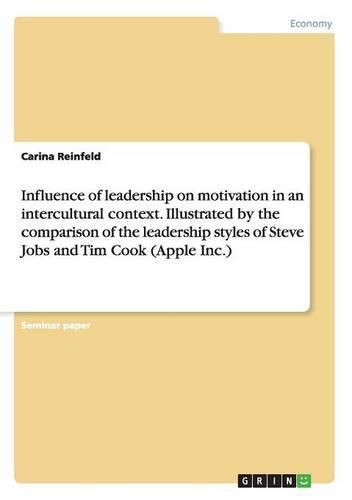Readings Newsletter
Become a Readings Member to make your shopping experience even easier.
Sign in or sign up for free!
You’re not far away from qualifying for FREE standard shipping within Australia
You’ve qualified for FREE standard shipping within Australia
The cart is loading…






Seminar paper from the year 2015 in the subject Business economics - Business Management, Corporate Governance, grade: 1,0, University of Applied Sciences Emden/Leer, course: International Strategic Leadership, language: English, abstract: In order to survive in the global competition companies have to establish a competitive advantage concerning quality, cost structure and productivity. Therefore, the reasons for the increasing internationalization are, for example, long-term cost advantages, limited availability of raw materials or skills shortages (Dulfer, Joestingmeier 2008). A high level of motivation leads to job satisfaction, goal-oriented behavior and thereby to better results (Kreitner, Kinicki 2013; Kleinbeck, Kleinbeck 2009). It is the task of a leader to motivate the workers at the best. Particularly with regard to the increasing internationalization and more complex global interdependence this task is getting more arduous. In addition, the personal traits of a leader influence the leadership style in a favorable or obstructive way. Considering the above named difficulties the following thesis presumes a possible linkage between leadership and motivation: The stereotypical use of motivation theories does not maintain the successful motivation of employees in an intercultural context. The key to efficient leader-ship is the consideration of individual needs of employees. In order to verify or disprove the thesis this paper begins by determining the conceptual background of the terms leadership and motivation and taking a closer look at selected motivation theories. With the presentation of the case of Steve Jobs and Tim Cook, the former and the current leader of Apple Inc., the impact of personal traits on leadership and motivation is taken into consideration additionally.
$9.00 standard shipping within Australia
FREE standard shipping within Australia for orders over $100.00
Express & International shipping calculated at checkout
Seminar paper from the year 2015 in the subject Business economics - Business Management, Corporate Governance, grade: 1,0, University of Applied Sciences Emden/Leer, course: International Strategic Leadership, language: English, abstract: In order to survive in the global competition companies have to establish a competitive advantage concerning quality, cost structure and productivity. Therefore, the reasons for the increasing internationalization are, for example, long-term cost advantages, limited availability of raw materials or skills shortages (Dulfer, Joestingmeier 2008). A high level of motivation leads to job satisfaction, goal-oriented behavior and thereby to better results (Kreitner, Kinicki 2013; Kleinbeck, Kleinbeck 2009). It is the task of a leader to motivate the workers at the best. Particularly with regard to the increasing internationalization and more complex global interdependence this task is getting more arduous. In addition, the personal traits of a leader influence the leadership style in a favorable or obstructive way. Considering the above named difficulties the following thesis presumes a possible linkage between leadership and motivation: The stereotypical use of motivation theories does not maintain the successful motivation of employees in an intercultural context. The key to efficient leader-ship is the consideration of individual needs of employees. In order to verify or disprove the thesis this paper begins by determining the conceptual background of the terms leadership and motivation and taking a closer look at selected motivation theories. With the presentation of the case of Steve Jobs and Tim Cook, the former and the current leader of Apple Inc., the impact of personal traits on leadership and motivation is taken into consideration additionally.